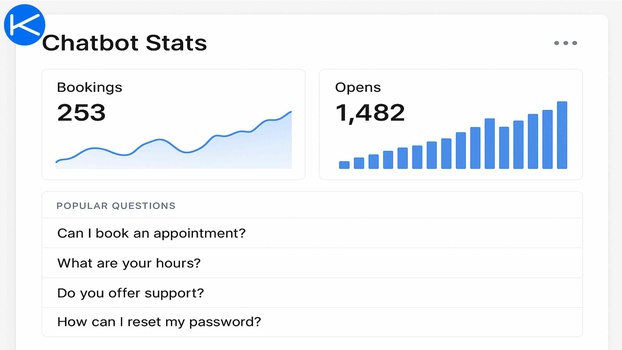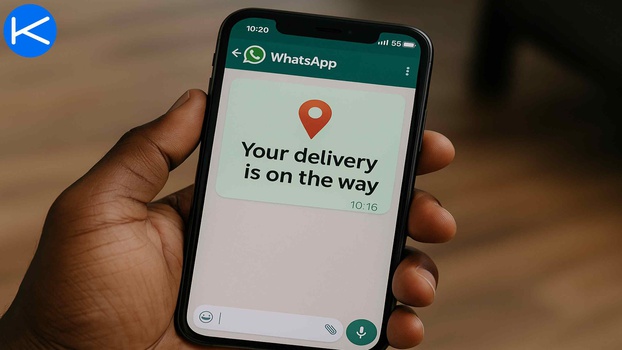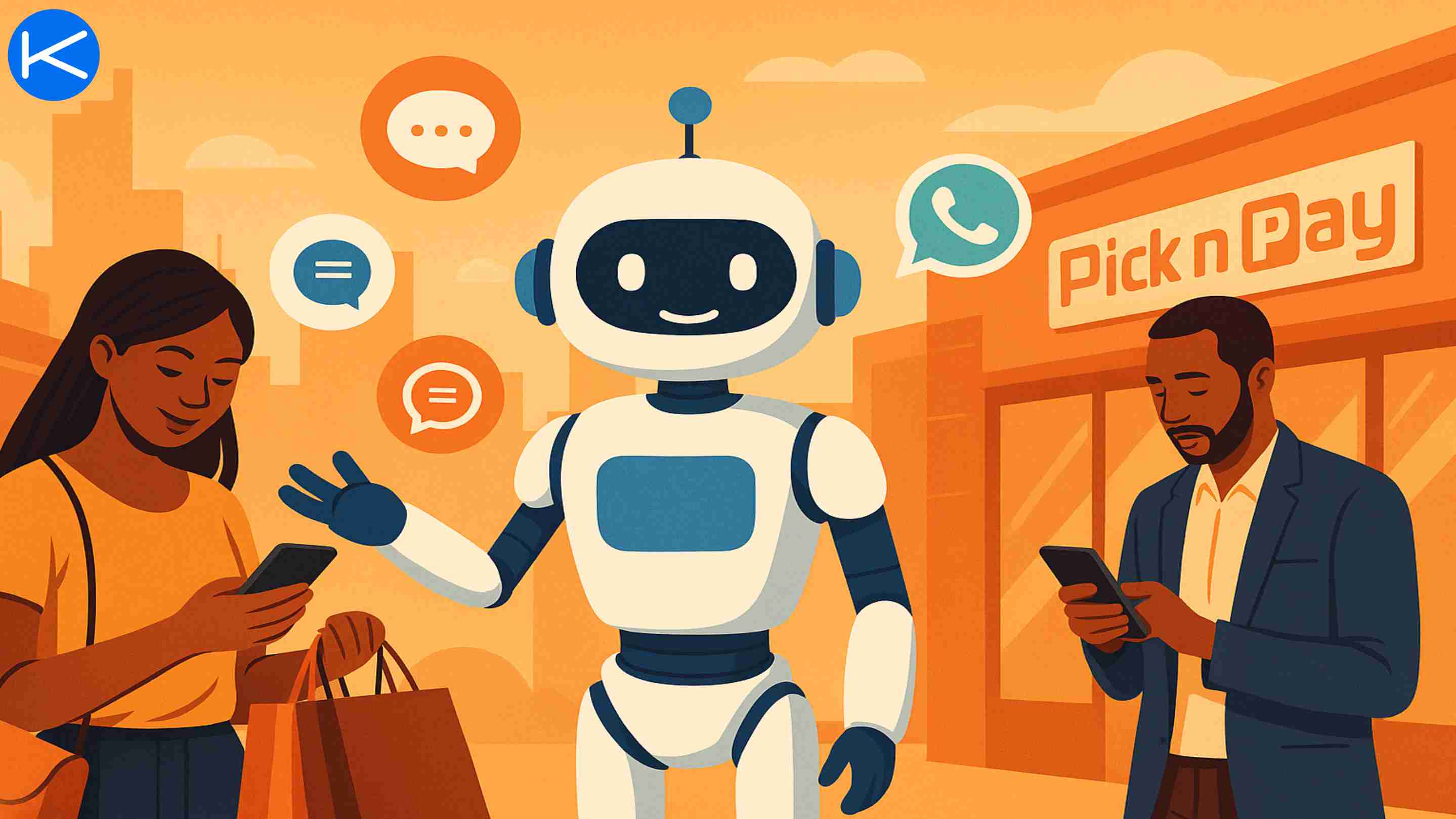Lethabo Moroka
9 months, 3 weeks
🇿🇦 Why WhatsApp Chatbots Are a Game-Changer for Local Businesses
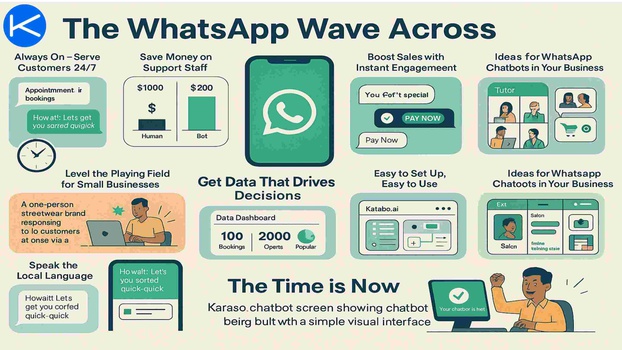
South Africa is a nation that lives on WhatsApp, with over 96% of internet users actively using the platform daily. It has become the heartbeat of digital conversations across cities, townships, and rural areas alike. For local businesses, WhatsApp is more than just a messaging tool — it’s a gateway to faster customer service, smarter sales, and deeper loyalty. WhatsApp chatbots are now stepping in as the new game-changers, helping entrepreneurs work smarter without extra stress. Imagine taking bookings, answering product questions, confirming orders, and sending payment links — all automatically. From township barbershops to city-based boutiques, businesses are using chatbots to serve customers better, even after hours. In a world where people expect instant responses, having a WhatsApp chatbot is no longer a nice-to-have. It’s essential for staying competitive and growing your brand.
in this blog we will cover..
- Always On – Serve Customers 24/7
- Save Money on Support Staff
- Boost Sales with Instant Engagement
- Level the Playing Field for Small Businesses
- Get Data That Drives Decisions
- Automate Deliveries & Follow-Ups
- Speak the Local Language
- Easy to Set Up, Easy to Use
- Ideas for WhatsApp Chatbots in Your Business
Always On – Serve Customers 24/7
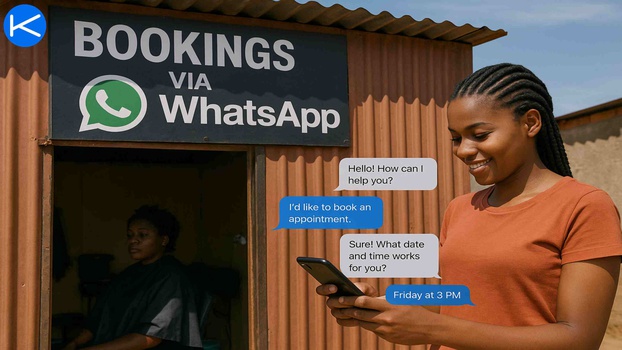
For many local business owners, every hour of the day feels like a race. Whether you're running a salon, a spaza shop, or an online clothing store, you're juggling customer queries, stock levels, admin, and marketing — all at once. It's a lot. And by the time the evening comes around, you're drained. But while you're taking a break or finally getting some sleep, your customers are still online, browsing and asking questions. That’s where WhatsApp chatbots become your most reliable business partner.
A chatbot doesn’t knock off at 5pm. It’s always available, responding instantly with helpful and accurate information, whether it’s 2pm or 2am. This means your customers can place orders, ask about your services, or confirm bookings even after hours — without waiting for you to reply in the morning. That convenience builds trust, and trust leads to more sales.
Take, for example, a Cape Town nail salon that integrated a Karabo.ai WhatsApp chatbot. They found that over 60% of their bookings were happening after 6pm, a time when the staff had already closed shop. Instead of missing out on these customers, their chatbot handled the conversations, confirmed appointments, and sent reminders — all automatically. In short, the business stayed open digitally, even when the doors were locked physically.
💸 Save Money on Support Staff
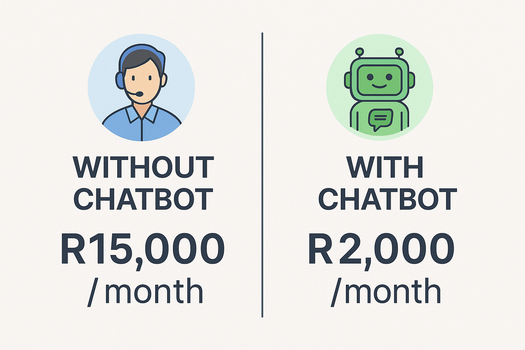
Hiring extra staff to manage customer queries can become a serious cost for small businesses, especially when the questions are simple and repetitive. Think about it — how often do customers message you just to ask, “Are you open?”, “How much is delivery?”, or “Where are you located?” These are important questions, but they don’t need a human to answer every time.
With a WhatsApp chatbot, these queries are answered instantly and automatically. That means you don’t need to pay someone to sit and respond to each message. It also eliminates delays, improves response times, and helps you maintain a consistent tone in communication. A chatbot becomes your first line of support, taking care of the basics so you or your team can focus on more complex or urgent matters.
One Johannesburg-based boutique saved over R5,000 per month in staffing costs after switching to Karabo.ai’s chatbot system. By automating their frequently asked questions, they reduced the need for extra staff while delivering faster, friendlier service. It’s proof that small changes in operations can lead to big savings — without sacrificing the customer experience.
🤖 Boost Sales with Instant Engagement

Customers today are used to speed. If they message a business and don't receive a response within minutes, many lose interest and move on to a competitor without a second thought. In a busy world where attention spans are short, responding quickly isn’t just nice to have — it’s critical. WhatsApp chatbots solve this problem beautifully by engaging with customers instantly. Whether someone is browsing your online shop late at night or making an enquiry about a service on a Sunday morning, your chatbot is there to reply immediately.
Instant engagement builds trust and shows professionalism. A customer who receives quick, helpful answers is far more likely to stay interested and move toward making a purchase. Rather than letting enquiries sit unanswered in your inbox for hours, a chatbot steps in and provides the information your customer needs to feel confident about buying. It’s like having a sales assistant ready at all hours, creating a smooth and satisfying experience.
Beyond answering basic questions, chatbots can actively drive sales by recommending products, sharing catalogues, offering discounts, and guiding buyers toward special deals. You can set up your chatbot to automatically highlight your bestsellers, suggest related products, or promote limited-time offers. This way, the bot does more than just reply — it sells, leading customers naturally from conversation to checkout.
For instance, imagine a customer messaging to ask about a dress. Instead of just sending a reply with the price, your chatbot could say, “Would you like to see matching accessories?” or “Buy 2 dresses and get 10% off — shall I show you the bundle options?” This smart upselling approach turns casual browsing into higher-value sales. With a well-designed chatbot, every conversation becomes a sales opportunity — and none of them are ever missed.
🏆 Level the Playing Field for Small Businesses

In the past, it was almost impossible for small businesses to offer the same level of service as larger companies. Big brands had the budgets to hire large customer service teams, invest in 24/7 call centres, and build fancy support systems. Small businesses, by contrast, were often left struggling to keep up. Today, thanks to WhatsApp chatbots, the playing field has been dramatically levelled.
With a chatbot, even a one-person business can appear as professional and efficient as a national brand. Customers receive immediate responses, can make bookings without waiting, and experience a smooth, reliable service from start to finish. It doesn’t matter whether you’re running a hair salon from your home or selling handmade crafts online — with a chatbot, you create the impression of a well-organised, always-on business.
Another huge advantage is that chatbots can be easily customised to match the tone and brand of your business. Whether you want to sound formal and polished or casual and friendly, your bot can reflect the personality of your brand. This helps build customer loyalty because people feel like they’re interacting with a real, trustworthy business — not just a blank service. In a country like South Africa, where relationships and word-of-mouth are so important, this personal touch can set you apart from your competitors.
📊 Get Data That Drives Decisions
Every customer interaction holds valuable clues about how you can improve your business. With traditional customer service channels, gathering and analysing this data can be difficult and time-consuming. However, WhatsApp chatbots make it easy to track conversations, monitor customer behaviour, and collect insights that help you grow smarter.
For example, chatbots can show you which products are most frequently asked about, what times of day your customers are most active, and which promotions get the most clicks. This information is pure gold. Instead of guessing what your customers want, you’ll have real data to back up your decisions. You can tweak your offers, adjust your marketing campaigns, or even introduce new services based on what the data tells you.
One Pretoria-based online shop, for instance, used chatbot analytics to notice a trend: customers were highly engaged whenever they offered free delivery. Based on this, they shifted their marketing to highlight free shipping more prominently — and saw a 30% increase in completed sales within a month. This is the power of data-driven decision-making: small insights, when acted upon smartly, can lead to massive growth.
📦 Automate Deliveries & Follow-Ups
Many businesses focus so much on closing the sale that they forget the importance of what happens after. Customers want reassurance that their orders are received, their payments are confirmed, and their deliveries are on track. Keeping them informed builds trust and encourages repeat business — but managing all those follow-ups manually can be exhausting.
This is where WhatsApp chatbots really shine. Once a sale is completed, the chatbot can automatically send an order confirmation, share a tracking link, and even update the customer when the delivery is nearby. All of this happens without you having to type a single message or make a single call. It’s a seamless, stress-free system for both you and your clients.
Beyond deliveries, follow-ups can also be automated. Your chatbot can check in with customers a few days after they receive their order, asking for feedback or a review. This not only shows that you care about their experience but also helps boost your online reputation. Positive reviews gathered through follow-up bots can become one of your strongest marketing tools, helping attract even more customers.
🌍 Speak the Local Language
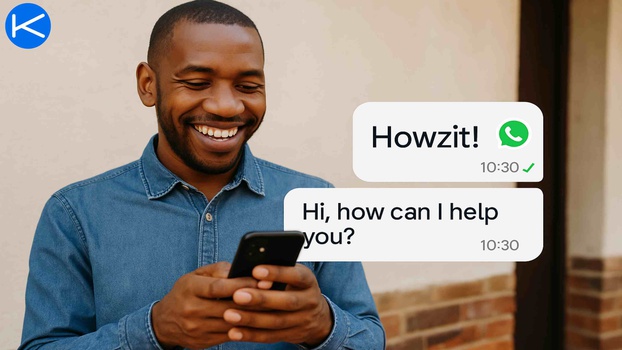
In South Africa, communication isn’t just about the words you use it’s about how you connect. Whether it’s a friendly “Howzit?” or a polite “Sawubona”, the way you greet and engage with customers matters. WhatsApp chatbots that understand and reflect local language, slang, and tone have a far better chance of building authentic relationships with users.
Instead of sounding robotic or stiff, your chatbot can be programmed to use casual, friendly, and natural South African English. It can even sprinkle in common local phrases to make conversations feel warm and relatable. When customers feel that a business speaks their language — literally and culturally — it breaks down barriers and builds trust much faster.
Take the example of a Soweto-based bakery that customised their chatbot with local slang and expressions. Customers responded with more enthusiasm, more bookings, and even sent the bot memes and emojis — treating it like a real friend. This proves that speaking to people in a way that feels natural can be just as important as providing good products or services.
🔧Easy to Set Up, Easy to Use

One of the biggest misconceptions about chatbot technology is that it’s complicated and only for tech experts. In reality, platforms like Karabo.ai make building and launching a WhatsApp chatbot incredibly simple — even for people who have never built anything digital before.
With intuitive drag-and-drop builders, pre-designed templates, and friendly support teams ready to help, setting up your first bot can take just a few hours. You don’t need to learn coding. You don’t need expensive equipment. All you need is your phone, your ideas, and a willingness to modernise your business.
Many South African entrepreneurs, from Durban to Polokwane, have launched chatbots in a single afternoon and immediately started seeing results. Whether it’s automating bookings, answering FAQs, or sending delivery updates, the right chatbot setup frees you from repetitive admin and lets you focus on growing your business.
💡 Ideas for WhatsApp Chatbots in Your Business

There’s no “one-size-fits-all” when it comes to using a chatbot. The beauty of WhatsApp automation is that it can be customised to fit your unique business needs. Here are just a few ways businesses across South Africa are using chatbots to save time, improve service, and boost profits.
If you run a hair or nail salon, your chatbot can handle appointment bookings, send reminders to clients, and share style menus. For an online store, it can show product catalogues, process orders, and update customers about delivery status. Tutors and private coaches can use bots to manage class registrations and share study materials. Restaurants and takeaways can use bots to send menus, take orders, and schedule deliveries or collections.
Even non-traditional businesses — like plumbers, fitness trainers, or mobile car washes — are finding ways to use chatbots to engage clients more effectively. The possibilities are endless. All you need is creativity, and your bot can become one of the hardest-working members of your team.
🧭 Getting Started with Karabo.ai
If you’re ready to transform your business with a WhatsApp chatbot, Karabo.ai is the perfect place to start. Designed specifically for South African entrepreneurs and businesses, Karabo.ai offers everything you need to build, launch, and manage a professional chatbot without stress.
You can start small, with simple customer service flows, and expand into more complex sales or delivery functions as you grow. Plus, you’ll have access to local support teams who understand the challenges and opportunities in the South African market. You’re not just getting software — you’re getting a partner who wants to see you succeed.
With free trials available and flexible plans to suit businesses of every size, there’s no better time than now to start automating, selling, and scaling smarter. Karabo.ai gives you the tools — all you have to do is take the first step.
